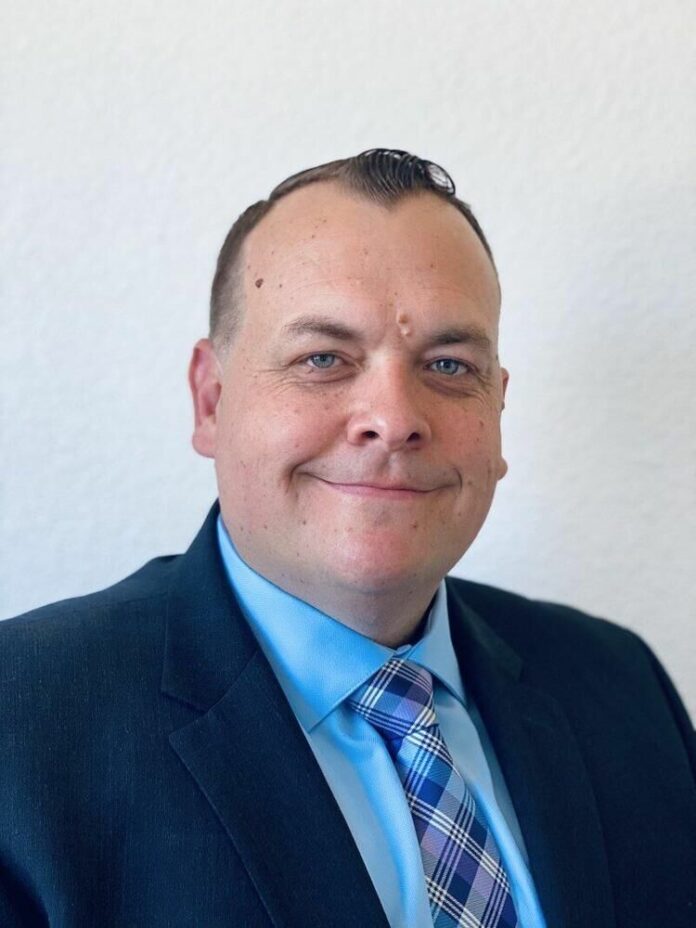Sebastopol mayor Patrick Slayter describes the city’s new police chief as calm, measured and appropriate. The ten-month search for the Sebastopol Police Department’s next numero uno involved exhaustive interviews in a hiring process coordinated by city manager Larry McLaughlin that assessed skill and community-mindedness, Slayter said.
“And I think the word that’s in the world these days is ‘de-escalation,’” he said. “And I think in a lot of ways that kind of professionalism, that kind of calmness and the ability to stop and listen is sort of an emotional de-escalation, which I think will serve everybody.”
The Sebastopol city leadership found their man in Daniel Healy, second-in-command at the Suisun City Police Department, who will join the force on Dec. 14 to be sworn in Dec. 15, according to a city press. He will relieve interim police chief Don Mort of the post he assumed mid-August after the previous acting police chief, Greg DeVore, stepped down.
Former police chief James Conner passed the baton to DeVore when he retired in December 2019.
The mayor said Healy soared to the top of the list following rounds of interviews that started with a panel of regional police chiefs and other law enforcement leaders recognized as progressive and concluded with meeting in-person with city administration and senior staff, including Mort. Healy then advanced to a dialogue with community leaders with decades-long ties to social equity issues, followed by an interview with the city council, he said.
Slayter said it was important to the council to ensure the police department would be managed in alignment with community values from the chief down through the ranks and that a key issue facing the incoming chief would be maintaining staff, which he said was a common challenge for smaller communities because larger departments offer more promotional opportunities.
Healy seems to fit the bill as an employee who enjoys a career in small towns. The United States Census Bureau estimated the population of Suisun City to be about 29,663 in 2019 while Sebastopol boasted a population of about 7,674 in the same year. Healy said it’s harder to make a difference in a giant organization like the LAPD, but in Suisun City, “everybody really matters.”
Healy described himself as a single dad with two teenagers. The 42-year-old said he’ll be commuting to Sebastopol from Solano County, at least until one of his kids learns how to drive. He grew up in Fremont and attained a degree in criminal justice from California State University, Stanislaus, where recruiters led him to join the Los Angeles Police Department in 2003, he said.
Healy worked in the LAPD for nine years, a year of which he spent in the Emergency Operations Division training for large-scale incidents, according to the Suisun City Police Department website. In the meantime, he got his master’s degree in Criminal Justice-Homeland Security Administration from Tiffin University, Ohio and learned the Incident Command System, a standardized federal system coordinating emergency responders to effectively direct resources in events like wildfires.
He relocated and joined the Suisun City PD as a sergeant in 2012 after his divorce when his children’s mother moved back to northern California, he said. Healy was promoted to commander in 2018 during his eight years with the department, according to the Sebastopol press release.
His 90-day plan begins upon his arrival in December with introductions and taking the pulse of the police department, its personnel, the budget status and the city of Sebastopol, followed by reviewing what he learned to start implementing plans in the third month.
“And I have ideas about doing virtual coffee with a cop or other kinds of things just to get myself to be able to meet people in that safe way,” Healy said. He reached out to some service organizations and other community groups, talking to the Analy High School principal, Soroptimist International and the Chamber of Commerce, he said.
Guessing he has about 13 years left in his career, the incoming police chief said he wants to work with communities to find long-term solutions to complex issues.
“It’s really a career where you can never know everything. Even the day I retire, I won’t know everything. So, it takes kind of a network of people to work together and think about things and solve problems,” he said. “Whether you’re at the patrol level or you’re at the administrative level, you need good partners to help you through the career and figure out because law enforcement is a difficult profession and it’s not so simple.”
Healy said the community leaders he met with during the interview process were from The 100 Black Men of Sonoma County, the Graton Day Labor Center and a Japanese-American association, wanting to know his philosophy and ensure all members of the community would be treated with dignity in each interaction with law enforcement.
Immigration issues arose in conversation, he said, as people wanted to know how the department would communicate that all people can report crimes to Sebastopol police without fear of prosecution themselves if they were undocumented.
Healy said coming after undocumented residents was not the role of a municipal police department, which he said was to ensure all community members feel safe to contact them and report any crimes they were victim to.
As a new chief, he views his role as being open to discussing solutions, concerns and questions and seeking solutions to challenges identified by community members. Healy said he is open to conversations about reimagining the role of policing, the context of homelessness or mental illness.
“I value innovation. I think a smaller organization really allows itself to … be able to implement things that could be contrary to what we’ve traditionally done, but are effective,” he said.
Healy said it’s difficult when national incidents happen that erode trust in his profession, but that it is the responsibility of officers to demonstrate that they want to be part of the solution and rebuild trust. Trust grows over a long period of time and law enforcement has a long way to go, he said.
“We’re not going to agree on everything and we’re not going to have the resources to solve every problem,” he said.
More tasks have been incorporated into the definition of policing throughout his career, like addressing homelessness, Healy said. Mental illness was already part of an officer’s equation when he joined the force, but the public view is shifting toward understanding homelessness and drug addiction as health issues, he said, which require a multi-disciplinary approach as some refuse services and others struggle to access them.
“So, the more that things become not a criminal issue, then they become less a police issue,” he said. However, Healy said reallocating funds to other areas was harder to do in small municipalities like Sebastopol that were already providing more basic police services.
The city was committed to having its own police chief to discuss Sebastopol’s best interests throughout his hiring process, he said, adding there is a cost associated with cities maintaining their own police agencies to have more local control rather than joining a larger conglomerate where the city is “just a customer.”
“We don’t see the issues that larger cities can see,” the mayor said. “But that’s not to say there aren’t problems. That’s why we’re going on a fact-finding mission.”
Healy’s selection arrives as the Sebastopol city council has authorized Jerry Threet to review its police department to uncover where its practices stand in the community conversation of training and policies so the council can “make sure we’re doing the right thing,” Slayter said.
Threet once helmed the Independent Office of Law Enforcement Review and Outreach, or IOLERO.
Slayter said Sebastopol enjoys an extremely low crime rate and that it was wonderfully coincidental that its police department review comes as the county’s mental health measure passed for a sales tax to fund mental health, homelessness and substance abuse services.
“And so I think we’re at a moment in history where we’re looking at the way police services are provided and in so many ways, it’s social services that are being provided. And who is best equipped, who is best trained, who is most appropriate to deliver those services is the larger question,” Slayter said.
He said the Crisis Assistance Helping Out On The Streets model, or CAHOOTS in Oregon is ideal. Eugene, Oregon’s CAHOOTS program allows some social service calls to city police to be routed to a team of mental health professionals who make first contact with someone in crisis or respond alongside police, according to the Eugene Police Department.
Sebastopol does not have that kind of funding, Slayter said. “So, having the funds available from the county through the mental health measure I think is going to help us a lot because then we’ll be refunding, funding anew, the mental health things that we need and appropriately not asking our law enforcement professionals to do that work who may or may not be well equipped for that work,” he said.
Slayter continued, “You know, you don’t want to go to your auto-mechanic and ask him to build your house. You want the right person doing the work.”
Healy will swear in as the head of the Sebastopol Police Department in December with a professed goal of building community relationships and long-term solutions within the law enforcement system.
“I mean, the violation is the violation, the enforcement is the enforcement, but it’s really in how we talk to people and how we deliver the message into how we carry ourselves all the time and just being genuine in the organization that way that, you know, we’re here to enforce the law but it’s not our job to punish anyone,” the new police chief said.
“It’s not our job to do any of those things, we’re just here to document and route people into the process that exists.”









